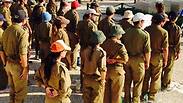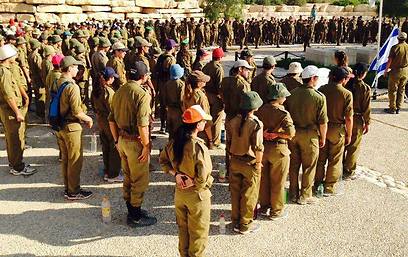
Israel's lone soldiers are 'never alone'
With more programs than ever for Diaspora Jews wishing to have an IDF experience, Israel does its best to ensure that those who volunteer have a home away from home.
For many, making aliyah alone means leaving behind family, friends, and familiarity. Some may have earned a degree before coming, or even dropped out of college to pursue the IDF—potentially changing the course of their lives. They decide to come to Israel alone, and volunteer for an army that can be in the midst of war, often unknowing what waits here.
The reasons are often the same - a love of Israel and empathy for the people here.
“The thought of my people - cousins in my mind - living under rocket fire was intolerable," says Alex Simone, a reserve soldier originally from Maryland. "I wanted to do something about it, and I knew I was still young enough to serve.”
Mordechai Graham, 22, also from Maryland, began his journey to join the IDF alone before eventually signing up for Garin Tzabar, a program specially designed for American Jews wishing to serve in the IDF.
“I actually think they do a really good job. Lone soldiers are pretty well taken care of,” Graham says of the program.
Simone was also grateful for the adoptive family the Garin program provided. “They gave me an adoptive family on a kibbutz. When I go back for Shabbat, I have my meals with them and they came to my tekasim (ceremonies) in the army.”
It was also a taste a family life, far from home, for although others who join up may have relatives in Israel, 24-year-old Simone does not.
“Just having some kids to climb on me every Shabbat was a much needed stress reliever from being ordered around all week long.”
“I knew the program would guide me through the steps of getting into the army. I heard of way too many people getting told to wait and wait for draft dates that kept getting postponed, and I had no patience for that,” he continues “the other big reason was the support structure that the program came with. Friends, a place to live, and people I could count on.”
Simone says Garin Tzabar is organized so that the army pays for the soldiers’ housing on the kibbutzim, so they do not have to worry about rent during their service. Furthermore, lone soldiers are eligible for a free month-long trip home, courtesy of the IDF.
Olim L’Tavor is a free, pre-army "mechina" (preparatory) program. It was established in 2012, and has been slowly growing every year. For three weeks, new immigrants planning to enlist at the end of August are given a crash course on Israeli history and what it means to serve in the Israel Defense Forces.
The main goal of the program is to give these incoming soldiers an easier transition into Israeli life, providing them with connections and friends. Participant Noach Detwiler, 18, from Missouri believes his pre-army experience gave him a better grounding than that of his sister, who joined the army without any preparation.
“I certainly feel like I have a much firmer foundation for going in to the army. I understand what I’m going into, I understand more about my country, more about my people, more about Zionism than my sister did because she just went in.”
Participants are treated as if they are soldiers, in order to prepare them for life in the army, and to prevent them from “an army culture-shock”, according to program coordinator and alumnus, Nathan Altshuler. The course teaches army values and skills, such as teamwork and discipline, among many others.
Tavor participant Adi Livne, 18, from Panama, compares the first hike of the program with their most recent one, in which she says they are clearly coming together as a unit.
“(On the first hike) we were all spread out,” she says, “we did a hike yesterday and you can actually see how we’re a group now and we work together and how we’re going to be able to survive all this. We’re going to go through this together.”
The program is trying to organize a new option for housing the soldiers of Tavor. “It’s something we’re trying to build for them to have a support system 24/7,” explains program guide Nicole Goldblatt. “Each year more olim will come and live in Natzrat Illit, forming a village of lone soldiers. That’s going to be an amazing improvement of the program, because then it continues, in a way, tighter connections with the mechina and with (each other).”
Israeli guides of the same age are provided to help instill a support system for the new immigrants. Their aim is to make a softer landing for the immigrants by providing built-in Israeli friends.
However, the program is still very new. Altshuler says more public attention from the international Jewish community is needed. “(It’s) a free program for soldiers… so (rather than) live in a hostel for six months before drafting…(they) can learn Hebrew, get to know people…and (they won’t) be alone.”
He continues, “it’s a present for them. People appreciate that they’re coming to do what they do.”
With programs like Garin Tzabar, Olim L’Tavor, among others, as well as organizations such as the Friends of the Israel Defense Forces (FIDF), and The Michael Levin Lone Soldier Center, increasing the quality of life and support for lone soldiers has been made an important goal for Jews around the world.
“You see so many people doing it, but it’s hard for us to be alone,” says lone soldier Mari Mordfin, from Maryland, “(but) we’re not really alone. Lone soldiers are never really alone.”











